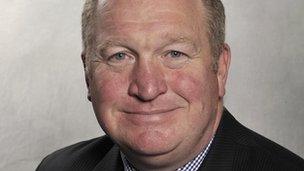Change of tack over NI welfare reform
- Published
- comments

Mike Penning is having talks with Nelson McCausland
Mike Penning's pugnacious performance on BBC Radio Ulster's Nolan show marks a change of tack by the London Department for Work and Pensions over the vexed question of welfare reform.
Previously, the London minister Lord Freud has held behind-the-scenes discussions with Stormont's Social Development Minister Nelson McCausland about what kind of flexibility Northern Ireland can be given to persuade reluctant MLAs to back the changes.
However, my invitations to the minister to explain what is going on have been spurned.
Perhaps because Mike Penning has just completed a spell at the Northern Ireland Office, he is happy to take a different route.
He launched an outright attack on Stormont MLAs, particularly Sinn Féin, for allegedly "burying their heads in the sand" over the financial implications of going it alone on welfare.
He is warning that multi-million pound fines will kick in from the turn of the year if the bill authorising welfare reform is not passed.
The executive has already negotiated some important concessions, ensuring welfare payments will not be monthly, as originally suggested.

The Stormont Executive has already negotiated some important concessions
Other concessions enable money to be paid to a primary carer rather than automatically to the head of a household, and payments to be made directly to landlords.
On Wednesday, the former DUP Minister, Sammy Wilson, also claimed a solution has been negotiated to the problem of the spare room subsidy known to its critics as the bedroom tax.
Mr Wilson says executive ministers have agreed to spend £17m to ensure no existing claimants lose out as a result of the spare room charge.
If the deal is as definite as the DUP claim, this should get around the objections of Deputy First Minister Martin McGuinness, who told the last Sinn Féin Ard Fheis he would use a petition of concern to block any imposition of a bedroom tax.
However, the DUP is still frustrated that Sinn Féin has not agreed to repeated attempts by Nelson McCausland to push the Welfare Reform Bill forward.
It is within that context that Mike Penning has decided to shake a big financial stick at the executive.
Sinn Féin, for its part, says it is defending its constituents against what it views as a cuts agenda, and points to the delays and problems with the welfare reform pilot programmes in Great Britain as evidence that playing a waiting game might not be such a bad tactic.
Last time the Welfare Reform Bill came to the floor of the Northern Ireland Assembly, in October last year, the debate lasted until midnight.
The bill progressed with support from the DUP, Ulster Unionists and Alliance, but Sinn Féin joined the SDLP and the Green Party in the "no" lobby.
Since then, the Ulster Unionists appear to have become more sceptical about the welfare changes, so when the measure comes to the assembly again Sinn Féin may not have the option of voting no in the knowledge that this will not kill the bill.
Apart from weighing up whether any more concessions can be extracted, Sinn Féin will also have to consider the possible financial consequences if welfare parity is broken.
There is also the wider context of Sinn Féin's fractious relationship with the DUP and their opposition to austerity measures on either side of the border.
Whatever decision Sinn Féin makes, Stormont is likely to be burning the midnight oil once again, if and when, the Welfare Reform Bill returns for its consideration stage.